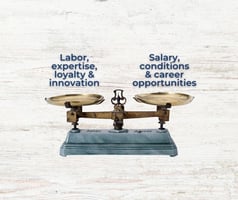Do you think a negotiation is just about having a conversation with ideally an agreement at its...
The HIGH cost of being satisfied
Going through recruitment processes can be such a drag on your nerves. So when you have met all the people and faced all the panels, is it any wonder if when the job offer finally comes through, that you look at the salary figure and feel like it's okay, you are satisfied with that amount?
That moment when you get a job offer - it's such a relief. It both validates what you have been saying about yourself throughout the process and finally (momentarily at least) silences that voice that is always there, telling you that you're not good enough. Then, when you look at the salary, it might look about right. Or it might be a little more than you were expecting. And in that moment you decide not to negotiate because you are satisfied with what you have been offered.
This moment points out an obvious truth. That often the reason that we negotiate in the first place is because we are dissatisfied with what we have.
It's the dissatisfaction that motivates us to get out of our comfort zones and do something about it.
Are women really that satisfied? Research carried out at the Georgia Institute of Technology in 1978, (Sauser & York 1978) concluded that women tended to be as satisfied (or more) than men in similar positions, even though they typically earn less than men. This conclusion has been replicated in the peer reviewed published research on a number of occasions since.
So why would this be the case?
I'm guessing you already know the answer.
The scientific research resolved the matter in 1984, in a Stanford University study. It established that women tend to have lower expectations regarding their salaries than men, and so were not disappointed when those low expectations were met. (Major & Konar 1984). A further study showed that women would estimate the salaries for roles between 3% and 32% lower than those reported by men. (Martin 1989) Bottom line - women tend to expect to be paid less. Aye karumba!
But here is what it is costing us. In Australia, women will earn on average $1 million dollars less over the course of their career than their male counterparts (Women's Economic Equality Taskforce Report, 2023) and we retire with 42% less superannuation (Clare, 2017). No matter which way you think about the ups and downs of your career that is a HUGE gap in earnings and financial security right there. With the cost of living rising and the property market growing faster than wages, the consequences of this kind of a gap for women are severe. Not just for individual women, but also for the families they love and support.
If you have all the evidence you need to see to know that NOW is the time to invest in developing your negotiation skills - then check out the FREE workshop next week to get started.




